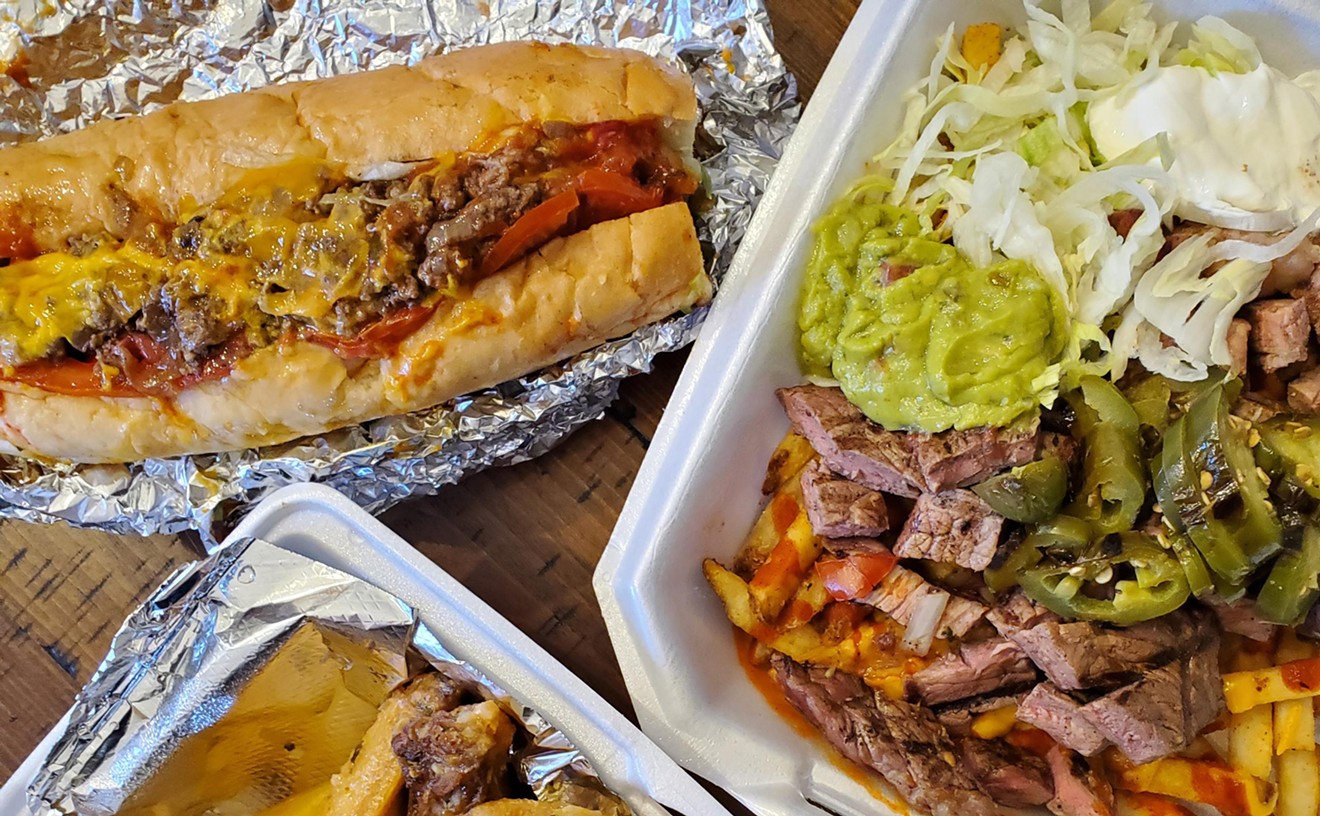Thanks to a huge shout-out this week in the New York Times, which ballyhooed restaurateur/chef Frank Bonanno, and four Denver restaurants -- Colt & Gray, Squeaky Bean, Fruition and Root Down -- for their farm-to-table blueprints, Bolton and others may soon see that wish fulfilled.
The story, which ran in the newspaper's travel section and was penned by Jay Cheshes, singles out those four restaurants for "celebrating Colorado's farmers, ranchers, cheesemakers and foragers, but also growing produce and other food themselves."
You can read excerpts from Cheshes's feature after the jump.
Of the Squeaky Bean, Cheshes writes:
That homegrown produce also shows up on the quirky menu designed by Max Mackissock, the Bean's other owner and its supremely talented chef. At lunch the seasonal offerings are limited to soups, salads and sandwiches -- including, during my visit, a generous plate of golden roast cauliflower tossed with mejdool dates, and an exceptional take on the croque-monsieur filled with slivered potatoes, thyme-flecked béchamel and prosciutto.Lunch was top notch, but Mr. Mackissock's more ambitious cooking at dinner is the restaurant's real revelation -- like wandering into a dive bar and discovering Bob Dylan on stage. Seated at a sidewalk table on another evening, we passed around generous plates of white tablecloth fare: buttery polenta topped with plump morel mushrooms, crispy "shake 'n bake" sweetbreads with poached pineapple and miniature basil, and a three-part pairing of asparagus and eggs featuring an egg cooked sous vide and asparagus mousse.
Mr. Mackissock's food is all the more remarkable for the tight quarters it's cooked in -- a smoky sliver of a room with a couple of immersion circulators but no actual stove (a full kitchen is still in the works).
Cheshes is just as complimentary to Fruition, whose owner and chef, Alex Seidel, is riding a wave of accolades for his restaurant, and his farm, which will soon begin producing its own sheep's-milk cheese.
On a recent evening in June, Mr. Seidel's deliciously rich spin on pasta carbonara was a perfect case in point, its components telling the story: housemade cavatelli, a locally sourced egg cooked sous vide, boutique farm pork belly, and pea tendrils from the chef's own Fruition Farm. The late spring tendrils also made an appearance atop a bowl of velvety sweet onion vichyssoise that had been poured tableside around a timbale of English pea mousse.Mr. Seidel purchased the farm, just south of Denver, in early 2009, and has already planted lettuces, herbs, baby turnips and rhubarb. This summer he dispatched a sous-chef from the kitchen to work on raising sheep at the farm (and on turning their milk into cheese).
Mr. Seidel isn't dogmatic about keeping things local. He serves Nebraska beef (with grilled matchstick asparagus and a frothy béarnaise), Indiana duck (with buttery risotto and his own baby arugula), and fillets of Minnesota walleye (with tender gnocchi, plump snails and wild mushrooms). Regardless of their origin, the ingredients in these bold (and reasonably priced) entrees mesh beautifully.
In his love letter to Root Down, Cheshes admits falling for the joint's cocktails, design and garden-to-fork food, but the accolades turn morbid when he mentions that Root Down owner/exec chef Justin Cucci's new restaurant (which is slated to open later this year in LoHi Marketplace), will be built in a "defunct morgue." Talk about a killer moment that stops readers dead in their tracks.
On the night I popped in for dinner, there were long waits for a seat in the dining room and on the large deck offering great views of the city. I found a vinyl stool at the bar among the after-work crowd, where I tucked into hoisin duck sliders (like duck sloppy joes) and plump mussels in a red curry sauce made with herbs grown in planters surrounding the restaurant. The garden boxes occasionally supplement produce supplied mostly by a local wholesaler.By this winter, though, Mr. Cucci hopes to be growing all of his own herbs and lettuces. He said he's also planning a "giant roof garden" on a second restaurant being built in a defunct morgue a few blocks away. "I look for buildings that have a history and a story," he said. "We're planning to keep some of the mortuary elements." If anyone can manage it, it might just be Mr. Cucci.
Cheshes, in his somewhat lukewarm shout-out to Colt & Gray, pimps the posh pub's small plates, while diplomatically advising persnickety foodniks to avoid a short list of main dishes. Dude, you really should have tried the burger and the duck confit hash.
Local meat and produce are spotlighted in the entrees, but the best course of action here is to stick with small plates. Neither the mountain of sweet carrots with crispy-skinned chicken nor the simply grilled Long Family Farm pork chop were nearly as intriguing as the mini beet "burgers" (beets and goat cheese on house-baked olive-oil financiers), munchkin gougères, and potted crayfish that preceded them.Although Mr. Perkins says he'd love to add a farm component to his operation one day, for now, homegrown produce comes in only occasionally from backyard patches tended by the cooks. "They get pretty excited by their urban gardens," he said. "But the growing season is unfortunately very short."
To read Cheshes's piece in its entirety, click here.










